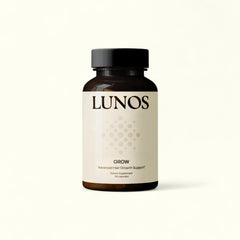Intro:
Biotin gets all the hype, but is it really the secret to thicker, healthier hair? And what if you’re one of the many people who break out or feel off when taking it?
If you’ve ever searched for hair growth supplements without biotin, you’re not alone. In this guide, we’ll break down why so many people are looking for biotin-free options, whether they actually work, and how to find a formula that supports real, visible results.
Why Most Hair Supplements Are Packed With Biotin
Biotin, also known as Vitamin B7, plays a role in keratin production, making it an easy go-to for beauty supplement brands. It’s inexpensive, heavily marketed, and often used as the “star ingredient” in hair growth products.
But here’s the truth: biotin alone won’t transform your hair, and in high doses, it may even cause unwanted side effects.
The Problem With Too Much Biotin
While biotin is essential in small amounts, mega doses can cause problems for some people:
-
Cystic acne or breakouts
Many users report skin issues after starting high-biotin supplements. -
Inaccurate lab results
According to the FDA, too much biotin can interfere with blood test results, including hormone panels and heart tests. -
Unbalanced formulas
Many supplements over-index on biotin and skip the deeper root causes of hair loss like hormones, inflammation, and nutrient absorption.
So… Do Biotin-Free Hair Supplements Actually Work?
Yes, if they support the real reasons your hair is struggling.
Hair growth isn’t just about one vitamin. The most effective supplements support a range of internal systems that impact hair health:
-
Hormonal balance – Ingredients like Saw Palmetto can help block DHT, the hormone tied to thinning.
-
Structural integrity – Collagen and amino acids like L-Cysteine help rebuild strands from the inside.
-
Circulation & nutrients – MSM, Bamboo Silica, and antioxidants help feed follicles at the root.
You can absolutely see real results without mega-doses of biotin, as long as the formula goes deeper.
What to Look For Instead
If you’re seeking a biotin-free or low-biotin supplement, look for one that includes:
-
DHT blockers (Saw Palmetto, Pumpkin Seed, etc.)
-
Collagen (preferably wild-sourced, marine-based)
-
MSM and silica (for follicle support and strength)
-
Amino acids like L-Methionine and L-Cysteine
-
Transparent ingredient labels with real dosages
Where Lunos GROW Stands
At Lunos, we didn’t want to create another generic biotin bomb.
Instead, we formulated GROW with a balanced dose of biotin, enough to support hair health, but not so much that it overwhelms your body or your skin.
Paired with powerful ingredients like:
-
Hydrolyzed Wild Cod Collagen
-
MSM & Bamboo Extract (70% Silica)
-
Saw Palmetto Extract
-
L-Cysteine & L-Methionine
-
Horsetail & Black Pepper Extract
It’s a formula designed for real, visible hair results, without compromise.
Ready to support your hair from within?
Join the waitlist for early access
FAQs
Is biotin bad for your skin?
In high doses, yes, it can lead to breakouts or cystic acne for some people.
What vitamins help hair besides biotin?
Collagen, zinc, vitamin A, silica, MSM, and DHT blockers are all key players.
What happens if you take too much biotin?
You may see side effects like skin issues and interference with blood tests.
Final Thoughts
Biotin isn’t bad, but more isn’t always better. The best hair growth supplements are balanced, transparent, and go deeper than surface-level solutions.
If you’re tired of hype and want something that works—you’re in the right place.
Explore Lunos GROW




